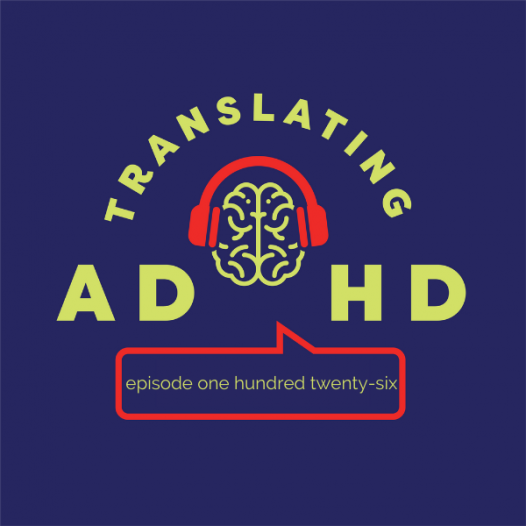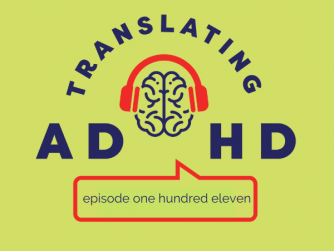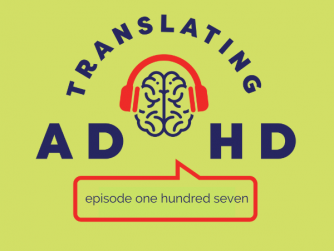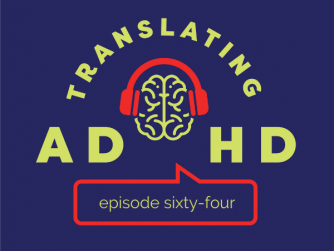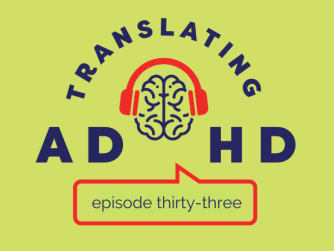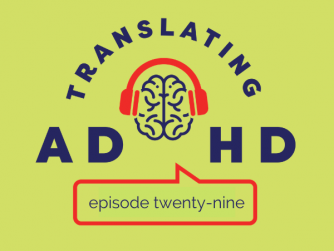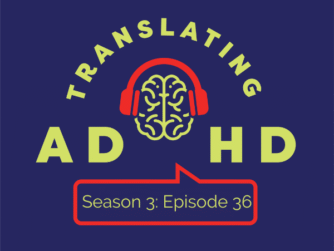It’s a very human behavior to look for an easy and convenient enemy when we struggle to move forward. We see it in our current political landscape and we see it in the world of ADHD management. When ADHD is discovered in a relationship it can become an easy scapegoat for the dynamic that is not working. On a broader scale, we can point to neurotypicals as the source of our neurodivergent woes and vice versa. In this episode, Shelly and Cam continue to discuss the challenge of exploring one’s ADHD when one doesn’t have the support of their partner.
The true enemy to positive change is ignorance and a propensity for all parties to jump to assumptions about confusing behavior. ADHD is invisible and inconsistent in its presentation. Cam and Shelly talk about the need to create space to explore our own ADHD experience so we can ultimately get to a place of trusting our own brain. They talk about the importance of bringing curiosity and compassion into the mix to locate and clarify a common base of knowledge – how one is experiencing their ADHD and how it impacts the relationship. One example is the ADHD behavior of the defensive/dismissive one two punch.
Shelly shares an excellent story about her own relationship and what she and her partner did to overcome a challenge and move forward recognizing each other’s needs. Finally, Cam discusses the importance of locating a community that supports and challenges and does not just echo one’s deepest fears and assumptions.
Episode links + resources:
For more of the Translating ADHD podcast:
- Episode Transcripts: visit TranslatingADHD.com and click on the episode
- Follow us on Twitter: @TranslatingADHD
- Visit the Website: TranslatingADHD.com
Episode Transcript:
Shelly: Hi, I’m Shelly.
Cam: And I’m Cam.
Shelly: And this is translating ADHD. Quick reminder that applications for the resilience group coaching are available on the website, along with all of the information about that course which begins Wednesday, June 22nd, at 8:30 PM Eastern. Visit the website translatingadhd.com and click on the group coaching tab for all of the information, including the application.
So, Cam, we’re going to continue our thread from last week and I’m going to punt it over to you to tell everyone what that means. Where are we going to.
Cam: Well, Shelly, first, we’re going to start with a sing-along.
Shelly: Oh, boy, I did not sign up for this. No, no, no, no.
Cam: Ready. Here we go.
Shelly: oh, okay.
Cam: Kumbaya my Lord Kumbaya. Kumbaya. I uh, come on. Yeah, there we go. Okay.
Shelly: right. All right. You got me to do a tiny bit. That’s all you get. That’s all you.
Cam: I told her that I had a surprise for her people. So last week we were talking about when you’re finding you have to go it alone. When you’re starting your ADHD journey, you’re on your journey and your partner’s not necessarily with you. And I love what you said last week about everyone’s been dealt a hand of Texas Hold’em and we’ve been dealt a hand of UNO. And through the session, we were talking about like ways to maybe separate and do our own work. With the idea of bridging back to right, how to bridge the Texas Hold’em and the UNO experience. And so that’s what we’re going to do today, but you know, as I listened to the podcast and write the description for it, it gets me thinking, doing my high level stuff.
And I lead with kumbaya because I think what we can do is we can often look for a common enemy.. it’s the, neurotypicals the neurotypicals are the problem, right? Capitalism is the problem, I’d be much more successful in a certain, you know, society.
And I loved, there was a Twitter response once it was like, you know what? Your communism is not going to get me out of bed and brush my teeth. It’s very convenient for all of us humans to identify an enemy and say, this is the enemy. And if you’ve got someone you are in a contentious relationship with who’s inside the wire with you right in the house, and you’ve got that anger, resentment, and big emotional triggers, we go to all these defensive postures and the gloves come off. And it’s very easy to blame each other, or as you were saying last week, that blame sponge and really taking all the blame ourselves with that one down. And so first I want to start with the enemy is not the other, the enemy is ignorance. The enemy is assumptions that we quickly make out of our fear center of the brain. Right. Everyone plays a part in the dynamic. The ADHD is coming into play, but it’s not solely responsible. And so last week we talked about yeah. When you cannot agree to disagree, when you can’t come to a common consensus of what the actual dilemma is, you may have to separate. Your train cars from each other for a bit, really to focus on the, my part of the mine, yours, ours. If we’re really not sure what the hours is stepping back and each doing their own work, and we’re here to support the ADHD partner in that. If your partner’s expectations are too narrow and too high to kind of step back and look okay. I want to see how my ADHD is coming into play for me. And in my relationship and a little distance can help there.
Shelly: Just want a sidebar and say, if you’re both the ADHD partner, this might be relevant for you as well. Because even if both partners have ADHD, that doesn’t mean that, you necessarily have an acute understanding of what’s going on for the other person, individual manifestation matters. Individual context and who that person is matters.
And I’m learning that in the relationship that I’m in now, I was previously married to a man that did not have ADHD. And now I’m in this relationship with an ADHD partner. And even as an ADHD coach, there are still unique challenges there. It’s different. Sort of challenge. And just because we both have ADHD and furthermore, just because I do this for a living, doesn’t necessarily make it easy because both of our manifestations are they’re impacting and it can be difficult to pick those things apart.
And there are times that we have to say, let’s come back to this because I need a moment to parse out what this is for me. I know what I said. In the heat of the moment, but I need a moment to parse out. What’s really true for me. And then we can reconvene.
Cam: Yeah. And we were talking about this before the episode. And love what you were talking about with, we need some space in order to trust our own brain,
Shelly: Mm.
Cam: That there’s trust in the relationship. And there may be lack of trust and all these different emotions, but in order to step back and start to really get a sense of is our reality. Can we trust our own brain? And that’s part of the ADHD dilemma, because Self-awareness and self-control are in play here. And if we can kind of get some space to explore this with curiosity and empathy for ourselves. Then we can see the ADHD and how its nuanced experience shows up for us.
Right. I love that you bring this in with, especially you and your partner, because it just speaks to the different valleys and the different flanks of Mount Rainier. There’s so many different interpretations and experiences of ADHD. The ADHD comes in unique ways, but it’s often invisible. It’s hard to see, but if we step back and away from these really charged places, these positions, we can start to create some understanding and a knowledge base that we can all agree on.
So another thing is, again, I said that the enemy is ignorance and lack of information, and also this sort of assumptions that can happen. And there’s an assumption here, Shelly, that I see in play for a lot of people ADHD partners and the non ADHD partner. And that is okay.
It’s about a year before. we’re going to give ourselves a year. It’s a nice convenient time and we’ll fix it. Right. So there’s two problems with that. One is that it fits nice and tidy into a calendar year. Number one, number two, that there is a fix this thinking of we’re going to get back to neuro-typical. Whatever that is. And so having these bigger conversations of first of all, can we agree that dynamic is not working because as we said last week, there’s two sets of facts, there are two experiences in play and you just can’t get to the point of a green. What’s not working. That’s the place to begin. Secondly, is agreeing that a different way of seeing the world. Is not a threat that often it’s this. I want my partner to agree with me and think like me, right? This is where differences compliment. This is where my wife and I got to. recognizing the way she’s sees the world and the way I see the world are very different, but we don’t see them as a threat to each other anymore. And sometimes it feels like she comes from way out of some left field, But that kind of recognition of these differences compliment and that what we’re working toward is something worthwhile.
Shelly: So Cam the one year fix, I see that so often with new clients, whether or not there’s a primary relationship at play. It’s the one-year fixed or the, I want to fix this as quickly as possible. And I like to say that my job as a coach is not to fix what’s broken. There is a powerful, incredible person engaging in that coaching relationship with me.
And my job is to help them step more into that person. Step more into strengthen unique value. And who they are capable of being, but I think that’s such a misinterpretation of coaching and I will say the really cool thing is we don’t get this so much from our listeners. There’s a pretty big distinction between a prospective client that comes, who has a podcast listener, and one who comes.
By way of referral or anything else in terms of where they are there. Because those of you listening, you’re already doing your own work here. You’re coming from a different place, but add some urgency into the mix. And that gap starts to close. Meaning podcasts, listeners who feel like their job is under significant threats their, Academic track is under significant threat or their relationship is under significant threat. It becomes much harder even with all the awareness that they’re coming with about what this work is and what it isn’t to stay in that place of curiosity with that client. And not go to the urgent, not go to the, I have to fix myself in order to fix this situation.
And my back is against the wall. So I’ll do the work the other way in the future. But for right now, know, my relationship is on the line. And that’s what needs fixing. And therefore I need fixing that urgency, that, threat of loss of something significant or important can really skew things very, very quickly.
Cam: Right. And so you’re speaking of our tendency to collapse things, collapse, meaning right. My relationship is in jeopardy. I’m in jeopardy. It needs fixing. I need fixing it all becomes this collapsed black hole. And so last week you were talking about detaching from outcome, right? and maybe possibly discussing and separating our measurements of success from our partners measurement of success to. Start to delineate what’s mine. What’s ours. What’s theirs. Everyone has their own work to do. And so this letting go and separating and creating some oxygen, some space, some sunlight here. And if you feel like your back is against the wall, it’s just going to summon that arc pony. And you can’t create positive change through adrenaline and urgency.
So when Shelly was talking about detaching from outcome last week, it’s detaching from this idea of it’s a one-year fix, right? We’re just going to take our meds. We’re going to do coaching. We’re going to do therapy. And we’re going to get back to some air quote Cam normal, right? Is you’re on this path.
And this is about journey thinking and appreciating. We may be going forth and we don’t know what our outcome’s going to be. That’s what we do in coaching is to talk with our clients and to tap into divergent creativity to embrace the possibility of multiple outcomes, multiple pictures of success, whether that’s with your partner or maybe, and we’ll talk about this next week without your partner, but back to this idea of spaciousness and informed choice and us being able to trust our brain more.
Shelly: Well said, Cam, and I think it’s worth pointing out that where we’re sitting as coaches. We’re not sitting in judgment of anyone’s relationship. I have a client who has a partner, has two kids, and there are some struggles there between the neuro-typical partner and the ADHD partner, my client being the ADHD partner.
And it’s been something that has come up in our coaching as a regular occurrence. It’s not all we’re coaching about, but it is. Within our broad set of regular topics. One of the things that we’re regularly coaching about, and a few sessions ago, I noticed that he got on the defensive a little bit and defensive of his relationship or of his partner.
And so I invited him to take a step back with me and to examine that, defensive place that he got to. And it brought a statement out of me that I thought was really useful and one that I will carry forward. Anytime I find myself in that situation again, which is me telling this client I am neither for or against your relationship.
I only know what you tell me. Number one, number two, my job as your coach is to help you create a life that fits and to detach from outcome. So just as I am neither for or against any other decision or conclusion you come to end coaching here to help you get there to facilitate that process of awareness and turning that awareness into action.
The exact same is true here, but it can feel different. And I know what that feels like from the other side, when I was going through my divorce, right? There’s this tendency to get really defensive, right? There’s this. Sort of Set of limiting beliefs that if something’s not right in my relationship, I can’t let other people see that I can’t let other people know that we’re having problems.
And we as a society kind of facilitate that. Right. We only see other people’s highlights. We only see the good in other people’s relationships. And we tend to get defensive when we’re talking about what’s maybe not going so well. So I think that was important to call out listeners, as you listened to this, whatever your relationship situation is, Cam and I are neither for or against the relationship you were in, we are for you creating a life that fits and the overarching point here, at least I think one of the overarching points Cam is that.
In order to do that, we have to be able to detach from outcome. And that can be really hard to do in something like a marriage where we’ve already committed to an outcome of till death do us part. It can be really hard to get into a curious Headspace where you can truly detach from outcome and get curious about your stuff but it can also be really powerful.
Cam: Oh, I love that. I think it really leads us to a place of sort of thinking about as we separate here and we start to identify the work is to start to see our own behavior and how we contribute to that dynamic. There’s something that I see in some of my clients where the behavior just reinforces a response from their partner and that is. You said getting defensive. There’s a one, two punch that just as a cocktail that just sends the other partner and that is defensive and dismissive to downplay. We tend to downplay, right? Because I think there’s a certain optimism that we can have. Oh, it’s not that big a deal. We get a little defensive and we downplay.
But part of that also is. Self-awareness we’re not seen as a whole picture. And so there’s some truth to what your partner is saying, but that kind of immediate pushback then creates a counter effect. So starting to own and notice our own behavior is a place to begin, right. To start to do my work right. There’s is it, Shelly? My mine, yours, ours. This is my word retrieval thing. Mine, yours, ours. Is that right?
Shelly: You got it. So, Cam, I’d like to share an example from my own relationship with both of us being people who have ADHD, there was this dilemma. We kept running into where my partner at the end of his workday, which is typically later than the end of my Workday, almost always because he works four tens, would want to we don’t live together at this point, but we’d want to hop on a phone call and do a lot of brain dumping and info sorting and executive functioning. Right. Sort of figuring out what’s next for him, you know, just verbalizing it all out. And he is to be fair and external process. And I tend to be a mix of both.
I have learned to do a lot of what he’s doing externally, internally, or in other ways. And this was really frustrating for me. However, I didn’t have really good language for why I just kept telling him, you can’t do this. You can’t do this. I don’t like it. You’ve got to find a different way to process out your stuff, which was met from him with, but this is how I process.
And I need your support here. All right. So here we have these conflicting set of needs, but we don’t really know what’s going on behind those needs. So And at the end of the day, when I’ve been coaching all day holding space for him for that was hard and painful for me.
It just made me upset. And there was this additional element where I realized that he was not realizing, I struggle with this stuff too. He’s looking at me and what I do for a living, looking at the fact and he’s doing his own work too.
Cam: Yeah, But you’re the pro you’re the
Shelly: Right. He’s doing his own work with his ADHD too, but that’s just, it I’m the pro I’ve got it together. I’ve got it figured out. And so there was a discounting on his part of the impact that that has on me. Right. You’ve got it figured out. So this shouldn’t be impactful on you when really it’s yeah, I’ve got it figured out, but it’s impactful enough on me to. Kind of keep my own stuff figured out, helping you also figure out stuff in this way is not working for me.
It’s taxing on me. It’s too much. And so meanwhile, he stepped back and realized what it was about those conversations that he really wanted. And he learned how to filter. So instead of hopping on the phone and first talking to me, you know, about his corporate job and all the nonsense there, which I’ve never worked in a corporation.
So I can’t relate to that. And just sort of dumping by way of venting. He started to figure out what is it that I’m trying to figure out here? And we found other ways to communicate that information to each other. We found other ways to support each other in planning to create some systems between the two of us so that we can help each other there.
But so that when our plans are intersecting, we’re both aware of what’s going on and what’s happening there. And we’ve got some really nice shorthand now because part of his habit too, when I would try to say, Hey, if you don’t have anything need to talk about this evening I’m going to hop off. Or if he’s on a break at work, and he’s only got two minutes left, as he would do what I call info dumping, I’ve only got a couple of minutes left to talk to you. So I got to get out every thought. And he didn’t realize that on my side, that felt like I got to hold all these thoughts right now.
You’ve got to be through me, all these balls that I got to juggle that there’s no time for us to dialogue about. And so now you’ve transferred the burden of. Discussing them or remembering to bring them up without giving me any opportunity to participate in that. So that shared language between us of info dumping has been really helpful.
Like, Hey honey you’re doing the info dumping thing. And we’re able to say it without emotional attachment to it. You’re doing the info dumping thing and he’ll go, oh shoot. Yeah. Yeah. Okay. I am all right. Back it up and I’ll hold that until we have a longer period of time to talk through these things.
Cam: Yeah, that’s so good. it’s very natural where our needs collide, right? This collision of needs in the sense of your partners need to vocalize what’s going on to verbalize what’s going on and your need to, again, at the end of the day, after coaching all day to have some quiet. Right to not be that receptacle of information at that time. So that creating that shorthand, that understanding what happened there though, was this acknowledgement on both parties.
Shelly: On both parties part that’s a fun sentence.
Cam: on both parties, parts, and this acknowledgement of. Each has a part to play. And in that, and then a gesture, I’m a big fan of gestures that his gesture of I’m going to do a little work to filter first sends you a message of yeah. I’m in it. I’m committed and I’m honoring your need. So this two step thing of kind of, first of all, Not pause, disrupt pivot around the whole defensive, dismissive discounting.
And let me just throw in mitigation too. That’s another big one we mitigate in the sense of laity. Can I just like shorten the timeline here? We jumped to a solution or just get through this quickly. The mitigation is another behavior to look for to notice your experience. And then start to give language to that experience in a safe and secure way where you can do it. And you’re not going to get on.
Shelly: Yeah.
Cam: Really love that. Yeah. I want to say one more thing about community. Cause I think that, again, this whole topic was born out of our discord community. And I think that as we may be get some distance. And separation from our partner. We want to find a community that is supportive, but not encouraging our biases and assumptions.
And we’ve talked about this before, is that there’s all kinds of ADHD communities out in social media, right? And so one that challenges and encourages and supports positive change. You don’t want to necessarily go into one that reinforces all of your negative biases, right? Where there’s a thread on you won’t believe what my ADHD partner did yesterday. Right? And this pylon reinforcing of they’re at fault, we’re in a position of, wrong. That’s not a community. That is just some echo chamber. So be mindful of that community that you go into, is it balanced, right? Is it realizing again, this nuance of, Hey, it’s not an easy fix. You can’t just do this tidy fix in one year.
Everyone’s on their own path and journey and is there curiosity and empathy for all in these environments.
Shelly: Well said, Cam
So if you’d like what we’re doing here on the show, three big ways you can help us out. The first is to leave a review wherever you listen. The second is to share us. Don’t keep us a secret. Share us on social. Share us with your neurodivergent support groups. Share us with the other ADHD people in your life. And for those of you that are professionals that are sharing us with your clients, we’re working with ADHD clients. Thank you so much. We appreciate that so greatly. And finally, you can become a patron for $5 a month. Visit the website, translatingadhd.com and click on the Patreon link in the upper right-hand corner. This gives you access to our discord community, where listeners are working together to do their own understand, own, translate work. And you are contributing to covering a hundred percent of the cost of running the show, including our editing and our assistant, which is a massive support for Cam and I, and makes it possible for us to keep doing this good work.
So we’re so grateful to those of you who have supported in the past or who are currently supporting. Thank you so much. So until next week, I’m Shelly, and this was the translating ADHD podcast. Thanks for listening.

